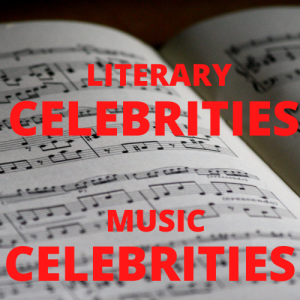 Because I teach literature, the idea for this blog post came from the classroom: how do you explain the persona of an author in terms that students can immediately grasp? How do you explain what it means to call someone a “Byronic figure,” or teach students to recognize the subtle disdain of Jane Austen’s narrator? Then, with a little help from an essay on pop music by Alva Noë that I’m teaching in Expository Writing, the answer hit me: the most recognizable personas of our time largely belong to pop stars. The comparisons below are what I came up with, but if you have any suggestions of your own please let us know; if we get enough ideas we can make a follow-up post!
Because I teach literature, the idea for this blog post came from the classroom: how do you explain the persona of an author in terms that students can immediately grasp? How do you explain what it means to call someone a “Byronic figure,” or teach students to recognize the subtle disdain of Jane Austen’s narrator? Then, with a little help from an essay on pop music by Alva Noë that I’m teaching in Expository Writing, the answer hit me: the most recognizable personas of our time largely belong to pop stars. The comparisons below are what I came up with, but if you have any suggestions of your own please let us know; if we get enough ideas we can make a follow-up post!
 Lord Byron is The Weeknd
Lord Byron is The Weeknd
Byron epitomized the tragic, haunted hedonist, both in his poetry and his troubled personal life. His poetry is sexy on the surface, but with a world-weary melancholy always close behind––much like The Weeknd’s hits “Can’t Feel My Face” and “The Hills,” in which self-medication through sex and drugs seems only to numb a sadness that’s always just below the surface. (Warning: in case that wasn’t clear, these songs may not be safe for work!)
Emily Dickinson is Billie Eilish
Dickinson famously remained obscure until her death, when her verses were discovered stashed in drawers in her bedroom. (Eilish started in obscurity and has guarded her privacy too––imagine if Dickinson could have posted her poems on YouTube!) The two are drawn to similar kinds of haunting imagery and blank, detached moods, as well. Doesn’t “I heard a Fly buzz––when I died” sound like it should be an Eilish lyric?
Oscar Wilde is Lady Gaga
With a flamboyant personal style and a legendary wit, Oscar Wilde was a queer icon before the term even existed; even a queer martyr, as he was jailed for his homosexuality and died at 42 in exile. Like the artist behind The Fame and The Fame Monster, Wilde’s image as a celebrity was in a lot of ways about celebrity itself––he famously said that “the only thing worse than not being talked about is not being talked about,” and (when asked to declare items at Customs) “I have nothing to declare except my own genius.”
John Keats is Bon Iver
A sensitive soul who wrote odes “To Melancholy” and “To Autumn,” if Keats were alive today he’d have an Instagram full of out-of-focus photos of secluded cabins and a closet full of flannel shirts. Enough said.
David Foster Wallace is Tool
Look, I’m calling myself out as much as anyone: in high school and college I LOVED both David Foster Wallace and Tool, and I still like both (as artists, if not as people). But fans of David Foster Wallace, like fans of Tool, have a certain reputation for being pretentious––and for insisting that if you don’t like it then you must not “get it.” So the next time you’re at a party and you see a guy prominently displaying a dog-eared copy of Infinite Jest, engage at your own risk: like the novel, the conversation may be long and packed with footnotes…
Jane Austen is Cardi B
If you read Jane Austen for tales of true love and impeccable manners, I have some bad news for you: the real Austen is, as the kids say, “savage.” Jane Austen’s narrator has an aloof, subtle, acid wit and a keen eye for markers of status––every time you see a reference to a horse-drawn coach, think of it as a Coach bag! Austen’s intoxicating style goes hand in hand with these flashes of disdain and cold-eyed materialism. What’s more, according to scholars, Austen’s work is more politically astute than you might recognize at first glance — much like amateur Presidency scholar Cardi B.
